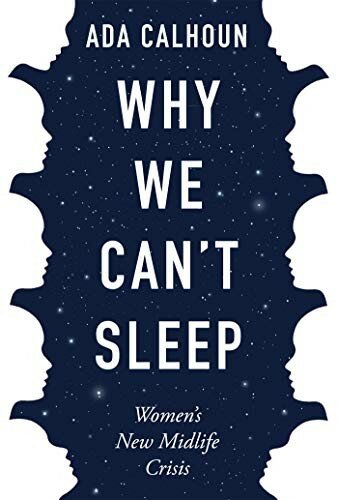
Why We Can't Sleep
Women's New Midlife Crisis
- اطلاعات
- نقد و بررسی
- دیدگاه کاربران
نقد و بررسی

November 4, 2019
Memoirist Calhoun (Wedding Toasts I’ll Never Give) explores the stresses keeping Gen X women up at night (both literally and metaphorically) in this bracing, empowering study. As women born between 1965 and 1980 enter middle age, Calhoun writes, they face “a gauntlet of anxieties” related to their status as “the Jan Brady of generations,” sandwiched between older baby boomers and younger millennials. Interviewing middle-class American women she met through friends, social media, and in doctors’ waiting rooms and other random encounters, Calhoun discusses worries about money (“Gen X has more debt than any other generation”), divorce (“our generation are the beta tested victims of the Boomers’ record-high divorce rate”), and caring for young children and ailing parents simultaneously (“the caretaking rack”). She shares her own experiences as well as data from the Center for Economic and Policy Research and Harvard’s Equality of Opportunity Project, among other sources. Despite all the damning statistics (“one in four middle-aged American women is on antidepressants”) and real-life reports of exhaustion, ennui, and husbands who go on ski trips instead of paying the electric bill, Calhoun persuasively reassures Gen X women that they can find a way out of their midlife crises by “facing up to our lives as they really are.” Women of every generation will find much to relate to in this humorous yet pragmatic account. Agent: Daniel Greenberg, Levine Greenberg Rostan Literary Agency.

Starred review from November 1, 2019
For women experiencing the signs of midlife, this book by Calhoun (Wedding Toasts I'll Never Give) collects stories relating to mental health, especially depression and anxiety, along with issues such as financial insecurity, job instability, parenting, caregiving, divorce, and other concerns that might prevent someone from getting a restful night's sleep. Built on personal narratives and research-based data, chapters focus on themes such as success, including what it means to be successful and the cost of achieving personal and professional success. Specifically looking at Generation X women, Calhoun asks why she and others continue to feel miserable despite traditional markers of success, such as children and a good career. Her research offers women ways to look at but not devalue their own experiences; she addresses the fact that women often minimize their own struggles instead of recognizing how their lack of sleep, along with other physical and mental pressures, constitute legitimate crises in their own right. VERDICT Calhoun's latest will be useful for those interested in feminist theory, especially insofar as it intersects with age and class, as well as a useful resource for people struggling to find balance in their personal and professional lives.--Emily Bowles, Univ. of Wisconsin, Madison
Copyright 2019 Library Journal, LLC Used with permission.

October 15, 2019
Calhoun (Wedding Toasts I'll Never Give, 2017, etc.) argues that Generation X women find middle age harder than those older or younger. The author is in her 40s and not enjoying this stage of life. In her latest, she offers a combination of her memories, recycled research, and interviews with "women who, by virtue of being middle class, grew up with reasonable expectations of opportunity and success." Calhoun is far more successful when she focuses on the problems of being a middle-aged American woman than when she attempts to define the nebulous differences between baby boomers, Gen Xers, and millennials and to convince readers that Gen Xers are suffering in ways that those older and younger aren't and won't. She defines Gen Xers as those born between 1965 and 1980 (data supplied by the Pew Research Center). On the basis of scanty evidence, Calhoun identifies them as being latchkey kids and children of divorce and hampered by receiving "two primary messages" from their childhoods as the offspring of overly optimistic feminist mothers: "One: Reach for the stars. Two: You're on your own." The author argues, for example, that Gen X kids were uniquely scarred by being witnesses to the Challenger spaceship disaster, neglecting to acknowledge that other generations--if generations can even be separated so neatly--had their own public traumas. Much of the book is devoted to demonstrating the suffering of "her" generation: "Gen X women undergo a bone-deep, almost hallucinatory panic about money," she writes, blaming this alleged state of mind on the fact that "much of Gen X graduated into a weak job market." Calhoun is on firmer ground when she discusses the stressors that affect middle-aged women in general: menopause and the physical changes that precede it, the challenges of dealing with older (and less appreciative) children and aging parents, and the fact that aging inevitably means that some life choices are no longer viable. An occasionally amusing and insightful but scattershot exploration of midlife woes.
COPYRIGHT(2019) Kirkus Reviews, ALL RIGHTS RESERVED.

December 1, 2019
Calhoun (Wedding Toasts I'll Never Give, 2017) hit a nerve when she published the Oprah.com article "The New Midlife Crisis" in 2017. Consulting hundreds of women, doctors, therapists, and other experts, she expands on that viral article in this deep-dive into the present situation for middle-class Gen X women (born 1965 to 1980). Alongside her subjects' own words (mostly anonymous), Calhoun shares her personal experiences and research on the economic, historic, and health factors affecting Gen X in chapters arranged by topics like money, divorce, and perimenopause. A scene-setting idea is that Gen X women were the first expected to truly "have it all"?an enormous pressure on its own. An assured, affable guide, Calhoun balances bleakness with humor and the hope inherent in sharing stories that will make other women feel less alone. She also gives good advice for finding support through midlife hardship. This is a conversation starter (as well as a no-brainer for book groups that count Gen X women among their members) that might get Boomer and Millennial readers curious, too.(Reprinted with permission of Booklist, copyright 2019, American Library Association.)




دیدگاه کاربران